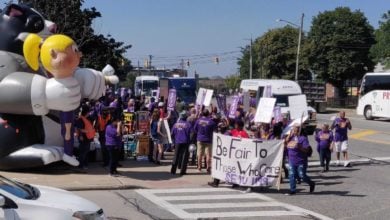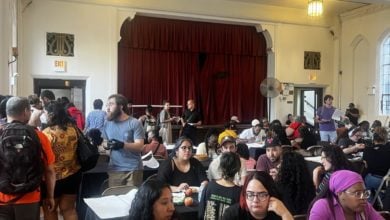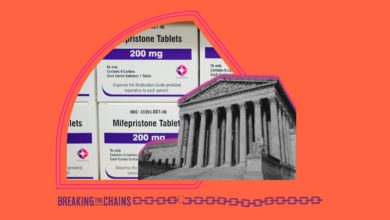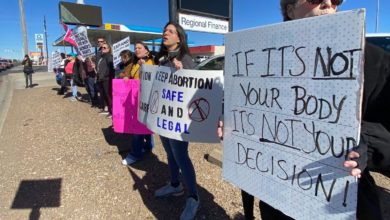NOTE: Many nursing homes and residential care facilities are instructing workers and residents to not speak to the media during this crisis. In addition, nurses in hospitals across the country have been threatened by administration or fired for warning their co-workers that the masks they were provided were not adequate protection. As such, the workers interviewed in this article have had their names changed to protect their identities.
As the federal government continues to neglect the needs of the people during the coronavirus pandemic, nursing homes and residential care communities are being hit hard. Since the elderly and those with pre-existing health conditions are particularly vulnerable to severe complications from COVID-19, elder care facilities are facing potentially deadly viral outbreaks. Across the country, we are already seeing the virus take its toll in these communities.
St. John the Baptist Parish in Louisiana has the highest per-capita death rate of any county in the United States, due in part to seven deaths, at time of writing, in a nursing home for veterans. A quarter of all nursing homes in New Jersey have reported COVID-19 infections. More than 50 residents and staff at Cedar Mountain Post-Acute Rehabilitation in California have been infected with the virus. In DuPage County, Illinois, there have been 10 confirmed deaths from coronavirus-related complications; six of them were in a single nursing home.
In total, more than 400 nursing homes across the country have reported at least one case of COVID-19 infection. The pandemic crisis, exacerbated by capitalism and profit-based health care, is threatening utter devastation on elder care facilities.
Elder care in the United States
In the United States, more than 2 million people live in either nursing homes or residential care communities. According to CDC statistics from 2016, 69.3 percent of the 15,600 nursing homes in the country have for-profit ownership. Similarly, 81 percent of the 28,900 residential care communities have for-profit ownership. As such, the majority of elder care facilities in the country are motivated fundamentally by the accumulation of wealth rather than providing quality, affordable care to those who need it.
No support for families
The majority of workers in elder care are women. Many of them are mothers with children to care for, and yet are forced to make difficult decisions between work and their family. Amelia, a single mother who works in a residential care facility in California, told Liberation News that her workplace does not provide paid family leave to workers. In turn, many workers, and especially working mothers, are forced to continue working even if this puts the health of their families in jeopardy.
Lack of protective pquipment
Capitalism’s drive to extract profits has placed the elderly and the workers who provide care for them at risk. Instead of prioritizing their safety, the federal government has allowed for an increasingly dangerous spread of COVID-19 in elder care facilities across the country, as workers struggle to provide essential care without essential personal protective equipment (PPE). One nursing assistant, Harriet, told Liberation News that her workplace in Cook County, Illinois, provides only one mask per shift to workers – despite having to assist residents in bathing and using the restroom!
“We only get one disposable mask per day. We have gloves but not enough masks. The masks we receive are very cheap and poorly made … we have quite a few [residents] that are extensive care and wear diapers, pull-ups, etc.”
– Harriet, nursing assistant
Similarly, Renata, a caregiver at a residential care community in Illinois, shared that although her work has PPE, they are being forced to change their masks less frequently than they normally would. Amelia described how her workplace provided every employee with one mask and a paper bag. The mask is stored in the paper bag at the end of each shift in order to be reused.
No hazard pay
Harriet and Renata both shared that they are not receiving hazard pay despite working in exceptionally dangerous conditions during the pandemic. Although their work is recognized as essential, they are expected to go to work, business-as-usual, even though the safety of themselves, their families and the elderly residents that they care for is being put at risk.
The consequence
In the nursing home which Harriet works at, there has already been one confirmed COVID-19 case. In Amelia’s, there have been two. Renata also stated that there have been confirmed cases in her workplace. In environments like long-term care facilities, where caregivers must maintain frequent close contact with residents, the lack of personal protective equipment, paid family leave and other protections can have a potentially catastrophic effect.
Mental health crisis
One of the key aspects that all of the workers interviewed expressed was a concern over mental health – both for workers and elderly residents alike.
Workers in elder care facilities have stressful jobs. This current pandemic crisis has only exacerbated this stress. However, many of the companies that operate nursing homes and residential care communities are not providing adequate mental health care services to their workers. Amelia talked of receiving a vague packet of “resources;” Renata was provided only with a hotline. In regard to mental healthcare in her workplace, Harriet stated: “We don’t have any mental health resources. We’re just told we can take a non-paid mental health day but that’s about it.”
This inadequacy in addressing mental healthcare needs affects the elderly adults living in these facilities as well. To comply with social distancing measures, family and guests have been banned from visiting their loved ones during the crisis. Many residents are kept in their rooms without the activities that the facilities normally provide. All of the workers interviewed were unsure whether residents at their workplaces were being provided with alternative means of communication with their families, such as video chat.
“I wish funds were being distributed to help keep a quality-of-life for the people in long-term facilities. Many of them are restricted to their rooms right now with no activities, not enough communication, and sometimes not enough staff. Imagine going through the stay-at-home order stuck in bed with nothing but a TV. And imagine the TV remote is never in reach because you can’t get up.”
– Renata, caregiver
Put people over profit!
Nursing home and residential care community workers, as well as the elderly residents of these facilities, must not have their health and safety sacrificed in the name of profit. In order to prevent further spread of the virus, there is a dire need for immediate relief.
The Party for Socialism and Liberation has a plan to combat the COVID-19 crisis. The Defense Production Act, or DPA, must be used and expanded to mass produce the necessary masks, gloves and other supplies that essential workers need to keep themselves and society safe. Everyone working right now should be receiving hazard pay and paid family and sick leave. Free health care and increased production and usage of COVID-19 testing kits would protect the health and safety of elder care workers and the people they care for.
In addition, we must also address the long-term crisis facing elder care: capitalism. With an increasing population of older adults, the eldercare industry is expected to continue to grow in the coming years. However, if it remains dominated by private companies and transnational corporations, the standard of care will suffer. This crisis has highlighted just how dangerous the capitalist mismanagement of health care is – it’s clear that we need a change.
Health care, including elder care, must be organized around meeting the needs of the people. All elderly people should be entitled to free, quality health care, including mental health and residential care. All long-term residential care facilities should be controlled by the workers and the communities that they serve, not corporate executives. Elder care workers should be guaranteed a living wage, paid family leave and more.
In providing vital care for some of the most vulnerable members of society, nursing home and long-term residential care facility workers are on the front lines of the struggle against COVID-19. They are the heroes that ensure our loved ones are cared for, and they deserve all of our support and solidarity.






